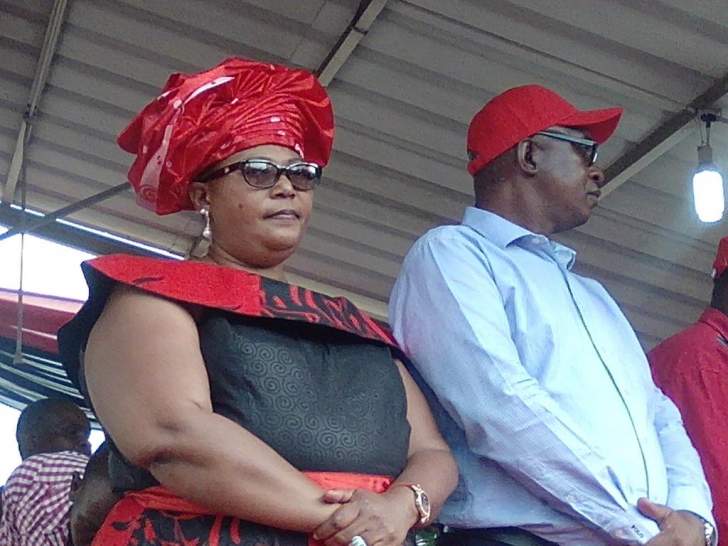The country's second largest city has since the turn of the millennium been regarded as an MDC stronghold in the process leaving the ruling Zanu-PF resorting to scrounging for the rural vote.
Not even the 2005 MDC split could kill the opposition's power base in Bulawayo, as the former labour-based movement led by the late ex-trade unionist Morgan Tsvangirai went on to retain seats in the city.
While the party has had several splits over the years along the arduous journey to rule this country, its stronghold in the city has remained intact. And with the formation of the MDC Alliance, analysts say the coalition of opposition parties stands a chance of running away with parliamentary seats.
However, it is the latest split which has seen former deputy prime minister Thokozani Khupe breaking away from the Nelson Chamisa-led MDC that has left some wondering if the jinx will finally be broken.
Khupe, who for the past years had regarded herself as the queen of Matabeleland, seems to have a lot of work to do in order to rewrite history and become the first breakaway faction to take away the party's dominance of the city.
Not to be ignored also is the advent of what are now termed regional parties who have also threatened to run away with the MDC vote in this part of the world.
Talk of the Lovemore Moyo-led United Movement for Devolution, Mthwakazi Republic Party (MRP) led by Mqondisi Moyo and Alliance for National Salvation (Ansa) led by Moses Mzila Ndlovu.
While their bid to form a regional coalition pact flopped recently, they have separately been on the ground canvassing for regional support mostly using such tactics as marginalisation, devolution and tribal imbalances among others.
Zanu-PF currently has six seats in the city which they won during by-elections after major opposition parties boycotted as part of their "no reform, no election" push.
History has, however, shown that the ruling party has its traditional voters who are usually never swayed by any grain of persuasion unless something major like the intra-factional politics has happened, like in the case of disgruntled Generation 40 (G40) members who have since formed the National Patriotic Front (NPF) party after being ruthlessly hounded out of the ruling Zanu-PF.
Analysts who spoke to the Southern News this week here seemed to agree that Chamisa might stand a big chance ahead of the regional parties for a number of reasons.
Political analyst Gifford Sibanda felt that voters had a tendency of going for parties that are perceived to be big.
"History has shown that voters read less on where the candidates come from but tend to choose on those that seem to be having numbers..." he said.
"These (regional) parties may tap into the discontent by the general populace and civic society group that MDC Alliance and Zanu-PF have not been able to provide candidates that reflect the tribal location of the constituencies. If this discontent counts for anything in terms of votes, they may stand a chance (but) only if they unite."
Another political analyst Dumisani Nkomo said while the regional parties may possibly have an impact, their major chance could have been through a united regional pact.
"There is some wisdom on the part of regional parties in focusing on local government and Parliament elections since these formations are interest-based and have geo-specific issues which they want addressed; for example devolution and marginalisation," he said.
"They need to form a formidable pact regionally and nationally to have an impact. They could win several seats here and there but the major challenge is that electoral behaviour in the past has tilted towards bigger parties at the expense of smaller parties or quality candidates," Nkomo said.
He, however, said Chamisa had a chance of winning the election, particularly through what he termed "new generation of voters".
Thando Gwinji, another political analyst, said politics anywhere was a game of numbers, but it was unfortunate that while the regional parties intended to make an impact, they didn't have the numbers on their side.
"Political parties in Matabeleland and particularly in Bulawayo are well aware that politics is a game of numbers and are also aware that they do not have numbers.
They are too comfortable in that space to an extent that even their policies dwell on Matabeleland-specific issues and have nothing to offer the whole of Zimbabwe," said Gwinji.
She added: "The Welshman Ncube-led MDC, Zapu and MRP have been around for quite some time pushing the same issues but have failed to have a coalition or proper working relationship that will help them have a joint voice in articulating issues of all generations."
"They are selling themselves short by targeting a few seats through a few well-known individuals, and when the president of a whole party is running for MP then there is definitely something wrong with the ideology of the party.
"It certainly means they cannot plant their ideas in Zimbabweans and gun for support, how then will their policies be heard in Parliament by the same Zimbabweans," Gwinji, who is also the Youth for Innovation Trust director, explained.
- dailynews
 Concern over Masvingo black market
Concern over Masvingo black market  Kenya declares three days of mourning for Mugabe
Kenya declares three days of mourning for Mugabe  UK's Boris Johnson quits over Brexit stretegy
UK's Boris Johnson quits over Brexit stretegy  SecZim licences VFEX
SecZim licences VFEX  Zimbabwe abandons debt relief initiative
Zimbabwe abandons debt relief initiative  European Investment Bank warms up to Zimbabwe
European Investment Bank warms up to Zimbabwe  Young Investment Professional (YIP) Graduate Programme 2019
Young Investment Professional (YIP) Graduate Programme 2019 











 Young Investment Professional (YIP) Graduate Programme 2019
Young Investment Professional (YIP) Graduate Programme 2019
Editor's Pick